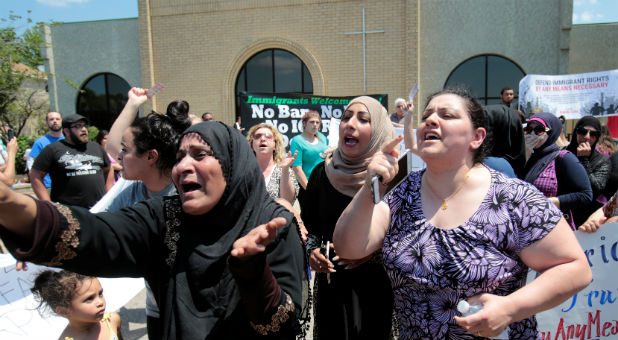Samuel Rodriguez, Russell Moore Beg Trump Administration to Halt Deportation Orders for Christians
Samuel Rodriguez, Russell Moore and a handful of other evangelical leaders begged the Trump administration to reconsider a recent deportation order for Iraqi Christians.
“A number of these Chaldean Christians face an immediate threat of deportation back to Iraq, a country where, as a result of their faith, they are likely to face oppression, persecution and possibly even death at the hands of extremists,” the Evangelical Immigration Table (EIT) letter reads.
The Table consists of Rodriguez, the president of the National Hispanic Christian Leadership Conference; Moore, the president of the Southern Baptist Ethics and Religious Liberty Committee; President of National Association of Evangelicals Leith Anderson; President of World Relief Scott Arbeiter; President of the Council for Christian Colleges and Universities Shirley V. Hoogstra; Hyepin Im, the president & CEO of Korean Churches for Community Development; and Jo Anne Lyon an ambassador and general superintendent emerita of the Wesleyan Church.
EIT is protesting the deportation orders for more than 100 Chaldean Christians who have taken refuge in Detroit. Immigration Customs Enforcement says many of these men hold criminal records. ICE rounded them up last month, but the Chaldeans have yet to be deported.
CCN reports the father of one has lived in the United States since 1992. His criminal history includes a felony conviction for breaking and entering in 1996 and misdemeanor convictions for possession of marijuana more than a decade later, according to the ACLU.
Yet many of these refugees have already paid their price.
“We do not minimize the serious criminal offenses of which some of these individuals have been convicted; it is entirely appropriate that they be punished for their offenses. However, having served their sentences, we must seriously consider whether it is just to deport a person who poses little risk to the American public to a situation where they are likely to experience significant harm because of their faith,” EIT’s letter reads.
The New York Times reports many of these refugees openly supported President Donald Trump during his campaign and the election season.
The article states:
“Christians in the Middle East have been executed in large numbers. We cannot allow this horror to continue!” Mr. Trump said on Twitter in January, returning to a campaign-trail refrain that had captured Chaldean hearts and ballots across this stretch of Macomb and Oakland Counties. As the Chaldeans like to say, once with pride, now with fury, the area helped tip Michigan to Mr. Trump in November.
Soon after the June 11 immigration raids, a local Chaldean noted the disconnect between tweet and deed. “Then why are you deporting them?” he wrote on Twitter, bracketing the question with a snarl of English, Aramaic and Arabic that would be unprintable in any language.
“Everyone thought this could not apply to us,” said Nadine Yousif, a lawyer with CODE Legal Aid, a local organization coordinating the community’s response to the raids.
The immigration authorities give the same explanation they have given for the arrests of tens of thousands of Latinos and other immigrants without legal status since Mr. Trump took office: These people, too, are what the government refers to as “criminal aliens.”
Though most of them came here legally, as refugees or through relatives who were American citizens, their green cards were revoked after criminal convictions on charges including theft, drug possession, rape and murder.
“The operation in this region was specifically conducted to address the very real public safety threat represented by the criminal aliens arrested,” said Rebecca Adducci, an Immigration and Customs Enforcement official in Detroit.
The men had been allowed to stay, in some cases for decades, because the Iraqi government had refused to issue travel documents for them to return.
That changed in March, when Iraq agreed to begin accepting deportees in exchange for being dropped from the list of countries affected by Mr. Trump’s revised travel ban, which barred citizens of several predominantly Muslim countries from entering the United States.
Mr. Trump “broke his promise,” said Nahrain Hamama, 54, whose husband has been detained.
The Trump administration, particularly Vice President Mike Pence, continues to be a vocal ally for those persecuted in the Middle East.
“And I’m here on behalf of the president as a tangible sign of his commitment to defending Christians and, frankly, all who suffer for their beliefs across the wider world. I stand here today as a testament to President Trump’s tangible commitment to reaffirm America’s role as a beacon of hope and light and liberty to inspire the world,” Pence said at the World Summit in Defense of Persecuted Christians.
“In Iraq, at the hands of extremists, we’ve actually seen monasteries demolished, priests and monks beheaded and the two-millennia-old Christian tradition in Mosul virtually extinguished overnight. In Syria, we see ancient communities burned to the ground. We see believers tortured for confessing Christ, and women and children sold into the most terrible form of human slavery,” the vice president continued. “Know today with assurance that President Trump sees these crimes for what they are: vile acts of persecution animated by hatred—hatred for the gospel of Christ. And so too does the president know those who perpetrate these crimes. They are them the embodiment of evil in our time. He calls them by name —radical Islamic terrorists.”
It’s in this spirit that EIT intercedes to Secretary of Homeland Security John Kelly on behalf of the Chaldean Christians.
“We would urge you to take the same approach to any individual, regardless of whether they share our Christian faith or not, who does not pose a threat to the safety of Americans and for whom deportation would be likely to result in persecution, torture, or death,” EIT’s letter concludes.
A federal judge last month halted the deportation orders, but these Christians’ lives still hinge on the Trump administration’s actions. {eoa}















































